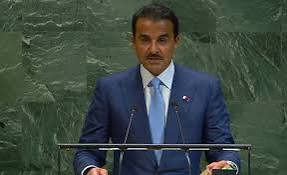The Emir of Qatar: Israel is not a democracy but hostile to its surroundings and support for the Palestinian people is necessary to achieve peace
September 23, 202572 ViewsRead Time: 2 minutes

Font Size:
16
The Emir of Qatar, Sheikh Tamim bin Hamad Al Thani, stated in his speech before the United Nations General Assembly that Israel is not a democracy in a hostile environment as its leaders claim, but rather hostile to its Arab surroundings.
He added that Israel is involved in building an apartheid system and in a genocide, and that its Prime Minister boasts about preventing the establishment of a Palestinian state and obstructing the achievement of peace.
Sheikh Tamim pointed out that Israel does not settle for agreements and truces based on imbalanced power dynamics, but seeks to impose its will on its Arab surroundings, considering that any opposition is portrayed in its propaganda as terrorism or anti-Semitism, which public opinion in allied countries has come to recognize and reject.
The Emir explained that Qatar was subjected to an attack on September 9 targeting a meeting of the negotiating delegation of Hamas, resulting in the death of six martyrs, including a Qatari citizen, and the injury of 18 others, describing the act as state terrorism and a blatant violation of international sovereignty. He affirmed that this aggression was against a mediating state working to resolve conflicts peacefully, and that it was an attempt to target political members of the negotiating delegation.
Sheikh Tamim warned that peace in the region cannot be achieved without a firm international stance, based on ending the occupation and allowing the Palestinian people to exercise their right to self-determination and establish their independent state.
The Emir also addressed other issues in the Middle East, pointing out:
Syria: Entering a transitional phase that allows for stability and development, calling on the international community to support the Syrian people to successfully overcome this phase.
Lebanon: Commending the recent positive steps to stabilize the situation, affirming Qatar's support for the Lebanese army and institutions.
Sudan: Calling on all parties for national dialogue to achieve sustainable peace and unity in the country.
Sheikh Tamim emphasized that the United Nations must restore the effectiveness of the collective security system and enhance international legitimacy, warning against allowing states to violate the law through force at the expense of international law and justice.
Sheikh Tamim pointed out that Israel does not settle for agreements and truces based on imbalanced power dynamics, but seeks to impose its will on its Arab surroundings, considering that any opposition is portrayed in its propaganda as terrorism or anti-Semitism, which public opinion in allied countries has come to recognize and reject.
The Emir explained that Qatar was subjected to an attack on September 9 targeting a meeting of the negotiating delegation of Hamas, resulting in the death of six martyrs, including a Qatari citizen, and the injury of 18 others, describing the act as state terrorism and a blatant violation of international sovereignty. He affirmed that this aggression was against a mediating state working to resolve conflicts peacefully, and that it was an attempt to target political members of the negotiating delegation.
Sheikh Tamim warned that peace in the region cannot be achieved without a firm international stance, based on ending the occupation and allowing the Palestinian people to exercise their right to self-determination and establish their independent state.
The Emir also addressed other issues in the Middle East, pointing out:
Syria: Entering a transitional phase that allows for stability and development, calling on the international community to support the Syrian people to successfully overcome this phase.
Lebanon: Commending the recent positive steps to stabilize the situation, affirming Qatar's support for the Lebanese army and institutions.
Sudan: Calling on all parties for national dialogue to achieve sustainable peace and unity in the country.
Sheikh Tamim emphasized that the United Nations must restore the effectiveness of the collective security system and enhance international legitimacy, warning against allowing states to violate the law through force at the expense of international law and justice.